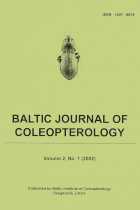INFLUENCE OF SOME ECOLOGICAL FACTORS TO ABUNDANCE OF SEED POD WEEVIL (CEUTORHYNCHUS ASSIMILIS PAYK.) IN WINTER OIL SEED RAPE COMMERCIAL PLOTS
Main Article Content
Abstrakt
The paper presents results of investigations of some abiotic (air temperature), biotic (parasitism) and anthropogenic (insecticide application) factors' influence on abundance, dynamics and injury of Ceutorhynchus assimilis Payk. (Curculionidae, CoJeoptera) in winter oilseed rape commercial plots in the Experimental Station of Lithuanian University of Agriculture, in the period 1995-96. Cold weather and frosts in the nights minimized the abundance of C. assimilis in winter oilseed rape from 29th of April to 2 1st of May in 1995. Insecticide application had measurable negative effect on the abundance and injury of C. assimilis in winter oilseed rape plot in 1996. In the treated winter oilseed rape plot C. assimilis was absent for 2 weeks after treatment. The number of infected pods was the biggest in untreated plot and made 6.1%, in treated plot - 4.7%. C. assimilis larvae were observed actively attacked by parasitoids: Trichomalus perfectus Walk, and Mesopolobus morys Walk. (Pteromalidae, Hymenoptera). Most active parasitoids were observed in the untreated winter oilseed rape plot in 1996; they attacked 59% of weevil larvae. In the treated plot the percentage of weevil larvae attacked by parasitoids was by 12.2 % less.
Article Details
Statystyki
Downloads
Download data is not yet available.
Rekomendowane teksty
